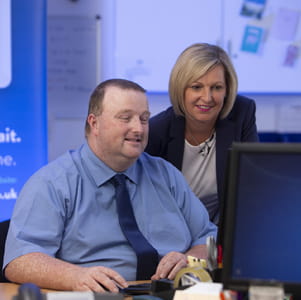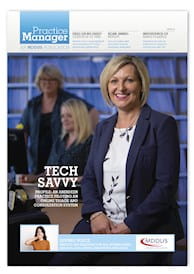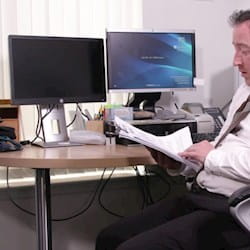
AN ESTIMATED one in five GP appointments is for minor conditions that could be managed with advice and self care, according to a 2016 report by the Local Government Association. Another report by the NHS Alliance argues that 27 per cent of GP appointments could potentially be avoided if there was more coordinated working between GPs and hospitals, wider use of other primary care staff and better use of technology.
Certainly something needs to be done to help address rising patient demand for primary care services across the UK, attributed in part to a growing elderly population and associated co-morbidity, but also the crisis in GP recruitment. One potential time-saving solution that has emerged over the last few years is the use of online patient triage services for general practice.
In 2014 the Scottish Centre of Telehealth and Telecare (SCTT) set out to investigate the technology available to facilitate online triage. Ten Scottish GP practices were selected to trial an online “first click approach” to patient consultation. A range of urban and rural practices were approached and among those selected was the Old Machar Medical Practice in Aberdeen. I recently visited the practice and spoke with manager Fiona Paterson and GP partner Dr David Cooper.
ONLINE CONTACT
Old Machar is among Scotland’s largest GP practices with over 18,000 patients cared for at two branch surgeries – one in Eastern Aberdeen, an area with high levels of deprivation, and the other in the more affluent north suburb of the city. The practice has five full-time and seven part-time partners, along with over 30 admin and nursing staff.
It’s perhaps not so surprising that Old Machar was selected for the e-consultation pilot as David Cooper has a keen interest in information technology, being an executive member of the Scottish National Users Group and involved in numerous IT steering and advisory groups.
“I always dread when he comes back from a meeting saying I just said ‘yes’ to something,” Fiona jokes.
David laughs. “Keeps the staff on their toes. But I’m really not techy at all. My interest is more along the lines: does the technology work? Is it what people want? How does it fit in systems-wise? Making it work is someone else’s problem.”
The system they were asked to make work for Old Machar was eConsult – an online triage tool developed by a group of London-based GPs along with a team of IT experts. eConsult bolts onto an existing practice website and invites patients to fill out an online form that captures symptoms associated with over 100 common clinical conditions. The tool is already in use in NHS England and Old Machar agreed to participate in a three-year trial starting in August 2016.
“We saw this as possibly the wave of the future and so we wanted to get in there early to see what it’s like, with no risk from a funding point of view,” says David.
Patients visiting the homepage of the Old Machar Medical Practice can access an e-consultation via a pop-up panel which asks them to input details on an online form. Among the options presented are help for a specific problem/condition, general advice on symptoms, or administrative requests such as test results, sick notes or a medical report. Patients are also advised of other ways to get advice either via the NHS 111 service or self care using the NHS Choices website.
Before being allowed to start an online consultation, patients are asked to confirm their problem is not an immediate emergency and that they are over 18 and consulting for themselves (not a child). The form then records patient details and takes the user through a series of questions to explore the nature of the complaint, capturing the symptoms using standard diagnostic scoring where possible.
“It starts with red flags,” says David. “Say the patient has low mood. It asks: Are there any suicidal-type thoughts? In which case, it does not allow the patient to go any further. It says you should phone the practice immediately.”
WORK FLOW
Information gathered using the online form is then output to a PDF document with a standard format so that clinicians can quickly review for the relevant information needed to treat the patient. At Old Machar the PDFs are received in the practice Docman system and admin staff forward them to the appropriate person – be that a doctor, nurse or other staff. These are then apportioned to appointment slots for review.
“Staff check the mailbox first thing in the morning and e-consults are already on appointment screens as soon as the doctors come in,” says Fiona. “The inbox is checked again at lunchtime and then about four o’clock – maybe three or four times a day.”
“We decided it shouldn’t be extra work; this is instead of work,” says David. “So essentially if you have three e-consults to do that day then you will have fewer urgent patients.”
The doctor then inputs a response into the Docman workflow and an administrator phones the patient back and reads out the advice and/or alerts them that a prescription is ready for collection, or to arrange an appointment for a face-to-face consultation. Some of the advice (including safety netting) can be pre-populated with existing text for common complaints such as viral-type infections. Advice and treatment are promised within two working days (or sooner if urgent).
“It’s always a phone back,” says David. “In order to close the loop, to be 100 per cent sure the patient and only the patient has got the info, you need a phone back.”
The practice is currently averaging around 50 e-consults per week which amounts to about five per cent of all practice consultations. A report by NHS Scotland covering a four-week period in 2017 found that Old Machar had saved 60 face-to-face appointments using e-consultations – the second highest in the pilot. Overall most e-consultations in the pilot were to do with administrative requests (test results, referral letters, etc) or general advice on a pre-existing problem. Common conditions included back pain, cold or flu, coughs and earache. Just over 40 per cent in the pilot practices resulted in face-to-face appointments and 11 per cent were dealt with by telephone consultation, 12 per cent with advice and 21 per cent were provided prescriptions.
“We’ve found that most problems turn out to be fixable without an appointment,” says David. “We probably only have to see about 20 per cent of the patients who complete an e-consultation.”
FUTURE PROOF
Most of the patients using the eConsult service at Old Machar fall within the early 20s to mid-40s age group, with the oldest user so far being 92. It has proved very popular with patients and the practice has seen “exponential” growth over the last year.
“The more people use it, the more people find out about it,” says Fiona. “We have a high percentage of repeat users because it works for them.”
That isn’t to say there has not been some resistance. “Just as you would expect in any practice we have GPs who prefer to see patients face-toface, and patients who prefer to be seen face-to-face,” says David.
It’s also not suitable for every patient and this is why the practice chose not to make it a “blanket” access system. Says Fiona: “This would create huge health inequalities at our King’s Street branch because not all our patients have computers.”
Overall the practice is very positive about e-consultations and expects to invest in some form of online system when funding for the current pilot ends in July of this year. Old Machar has also recently expanded patient access with the option of video consulting using the Attend Anywhere platform.
“We feel it’s the way to go,” says Fiona. “We need to adjust services to meet changing needs. That’s how many younger patients want to communicate – text, email, video. What we are doing is just in line with that – the way of the future.”
Jim Killgore is managing editor of MDDUS Practice Manager
IMAGE: Dr David Cooper and practice manager Fiona Paterson. CREDIT: Newsline Media
This page was correct at the time of publication. Any guidance is intended as general guidance for members only. If you are a member and need specific advice relating to your own circumstances, please contact one of our advisers.
Read more from this issue of Practice Manager

Save this article
Save this article to a list of favourite articles which members can access in their account.
Save to library

